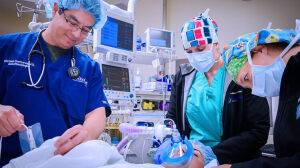FTC says anesthesia practice and private equity firm monopolized Texas practices
by
John R. Fischer, Senior Reporter | September 26, 2023

The FTC says that U.S. Anesthesia Partners and private equity firm Welsh, Carson, Anderson & Stowe created a monopoly in Texas. (Photo courtesy of USAP)
The Federal Trade Commission is seeking a permanent injunction against U.S. Anesthesia Partners and its founder, private equity firm Welsh, Carson, Anderson & Stowe, accusing both of swindling Texans out of tens of millions over the past decade by monopolizing the anesthesiology landscape in the state.
In a complaint filed in the U.S. District Court for the Southern District of Texas, the commission says that since its founding in 2012, USAP has acquired over a dozen anesthesiology practices in Texas, raising the rates of each one that it bought to match its own higher rates. This, it alleges, led to a significant price hike for the same doctors that patients saw before, and was part of a roll-up strategy between USAP and Welsh Carson to make USAP the dominant anesthesia service provider in Texas, including in metropolitan areas like Houston and Dallas.
According to the FTC, Welsh Carson, which now owns a minority stake in USAP, created it and came up with a three-part strategy where the two bought nearly every large anesthesia practice in the state and then charged higher prices. They hiked prices further through agreements with independent practices and brokered a deal with a competitor to keep out of USAP’s territory.
If true, this would constitute unlawful monopolization and acquisitions, conspiracy to monopolize, unfair competitive methods, unlawful restraints of trade, and violations of the FTC and Clayton Acts, according to the suit.
“These tactics enabled USAP and Welsh Carson to raise prices for anesthesia services—raking in tens of millions of extra dollars for these executives at the expense of Texas patients and businesses,” said FTC Chair Lina M. Khan.
In a statement, USAP said the complaint is based on flawed legal theories and lacks a medical understanding of anesthesia and the company’s business model and level of care. It also said that all USAP practices are clinically independent and locally governed by physician owners who control all clinical decisions, and that no anesthesia practice has power over health plans, with many larger than USAP and any physician group in size, revenue, and profits.
It adds that commercial negotiated prices have increased modestly over the years, but remain essentially flat when adjusted for inflation. “Over the last decade, our collaborative partnerships with facilities and health systems have led to improved outcomes with positive impacts on the overall costs of care to the hospital systems, health plans, and patients we serve,” Dr. J. Scott Holliday, a USAP physician and board member in Texas.
Welsh Carson spokesperson Amy Stevens said the complaint is “consistent with the series of recent lawsuits that the FTC has filed, using litigation to pursue radical policy theories,” and that the firm and USAP are “confident we will prevail” in court.
The FTC is seeking equitable relief necessary for USAP's and Welsh Carson’s anticompetitive conduct and to prevent it from recurring.
|
|
|
You Must Be Logged In To Post A Comment
|
